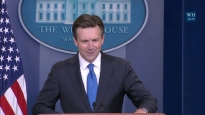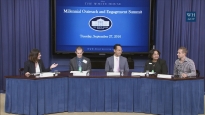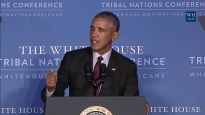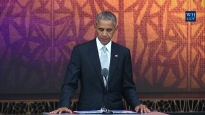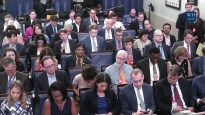President Obama Speaks on the Economy
May 08, 2012 | 21:34 | Public Domain
President Obama introduces his “to-do list” for Congress, a list of initiatives that will create jobs and help the middle class, and calls on Congress to take action on the list’s first item by passing legislation that rewards companies who bring jobs back to American with lower taxes and pay for it by eliminating tax incentives for companies to ship jobs overseas.
Remarks by the President, Albany, NY
College of Nanoscale Science and Engineering
State University of New York
Albany, New York
1:24 P.M. EDT
THE PRESIDENT: Hello, New York! (Applause.) Thank you. Thank you so much. Thank you. Everybody, please have a seat. It is great to be back in Albany. It is wonderful to be with all of you here today.
And I want to thank Governor Cuomo not only for the outstanding introduction, but also for the extraordinary leadership that he's showing here in the great state of New York. Please give him a big round of applause. (Applause.) He is doing outstanding work.
I also want to thank Mayor Jennings, who's here. Give the Mayor a big round of applause. (Applause.) Don't be shy. We've got Chancellor Zimpher -- (applause) -- we appreciate very much. Dr. Kaloyeros -- I want to make sure I say that right, folks mess up my name all the time -- (laughter) -- Kaloyeros for hosting us here today. (Applause.) We’ve got a couple members of Congress here -- Paul Tonko. (Applause.) And also, Representative Chris Gibson is here. (Applause.)
And all of you are, and I'm happy about that. (Applause.) Yes. So it is wonderful to be here at the University of Albany NanoCollege. This is one of the only colleges in the world dedicated to nanotechnology. And it’s a incredible complex. But you’re working on particles as small as an atom, and you’re doing it in rooms that are 10,000 times cleaner than a hospital operating room –- which is very impressive, since "clean" is not usually a word I associate with college students. (Laughter.) Maybe things have changed since I was in school.
Now, the reason I came here today is because this school -- bless you -- and this community represents the future of our economy. Right now, some of the most advanced manufacturing work in America is being done right here in upstate New York. Cutting-edge businesses from all over the world are deciding to build here and hire here. And you’ve got schools like this one that are training workers with the exact skills that those businesses are looking for.
Now, we know the true engine of job creation in this country is the private sector -- it's not Washington. But there are steps we can take as a nation to make it easier for companies to grow and to hire, to create platforms of success for them -- everything from giving more people the chance to get the right training and education to supporting new research projects into science and technology. In fact, there was a substantial investment made here -- I was talking to Governor Cuomo about the investment his father made here to help get this center started.
There are things we can do to make sure that if you’re willing to work hard and meet your responsibilities, you can find a job, own a home, maybe start a business, and most importantly, give your kids a chance to do even better than you did. And that’s something we believe has to be available to everybody, no matter where you come from, no matter what you look like. We can make a difference. And at this make-or-break moment for America's middle class, there’s no excuse for inaction. There’s no excuse for dragging our feet. None.
Now, over the last few years, there are certain steps that I’ve been able to take on my own to help spur the kind of innovation that we're seeing here, and also to help the overall economy grow. So we announced a new policy several months back that will help families refinance their mortgages, save up to thousands of dollars a year. We sped up loans and competitive grants for new projects all across the country so thousands of construction workers can get back on the job. We simplified the student loan process to help roughly 5.8 million students -- like the students here -- save money on repayments. (Applause.)
So these are some steps that the administration has been able to take on its own. But the truth is, the only way we can accelerate the job creation that takes place on a scale that is needed is bold action from Congress.
Because of the Recovery Act, because of all the work we've done, we've created over 4 million jobs over the last two years. We've created hundreds of thousands of jobs each month over the last several months. So we're making progress, but everybody knows we need to do more. And in order to do that, we're going to need some more action from Congress. Democrats and Republicans have to come together. And they've shown that they can do it. I mean, they did some important work. They passed tax cuts for workers, approved trade deals to open up new markets for American products. We reformed our patent system to make it easier for innovative ideas to come to market. Those are all good things. But the size of the challenges we face requires us to do more.
So back last September, I sent Congress a jobs bill that included all sorts of policies that we knew would help grow our economy and put more Americans back to work. That wasn't just my opinion, that wasn't just the opinion of Democrats. It was the opinion of independent, nonpartisan experts -- economists who do this for a living, and analysts on Wall Street who evaluate what's going to really make the economy grow. The one big piece that we were able to get done was make sure that we didn't see payroll tax go up and people get 40 bucks taken out of their paychecks each time.
But most of it didn't get done in Congress. Just about every time we put these policies up for a vote, the Republicans in Congress got together and they said no. They said no to putting hundreds of thousands of construction workers back on the job repairing our roads and our bridges and our schools and our transit systems. No to a new tax cut for businesses that hire new workers. No to putting more teachers back in our classrooms, more cops back on the beat, more firefighters back to work. And this is at a time when we know one of the biggest drags on our economy has been layoffs by state and local governments -- that's true all across the country.
And it's worth noting, by the way -- this is just a little aside -- after there was a recession under Ronald Reagan, government employment went way up. It went up after the recessions under the first George Bush and the second George Bush. So each time there was a recession with a Republican President, compensated -- we compensated by making sure that government didn't see a drastic reduction in employment.
The only time government employment has gone down during a recession has been under me. (Applause.) So I make that point just so you don't buy into this whole bloated government argument that you hear. And frankly, if Congress had said yes to helping states put teachers back to work and put the economy before our politics, then tens of thousands more teachers in New York would have a job right now. That is a fact. And that would mean not only a lower unemployment rate, but also more customers for business.
Now, I know this is an election year. But it's not an excuse for inaction. Six months is plenty of time for Democrats and Republicans to get together and do the right thing, taking steps that will spur additional job creation right now. Just saying no to ideas that we know will help our economy isn’t an option. There’s too much at stake. We've all got to pull in the same direction.
So even if Republicans are still saying no to some of the bigger proposals we made in the jobs act, there are some additional ideas that could help people get to work right now and that they haven't said no to yet -- so I'm hoping they say yes. And they’re simple ideas. They’re the kinds of things that, in the past, have been supported by Democrats and Republicans. These are traditionally ideas that have had bipartisan support. They won’t have as big of an impact as rebuilding our infrastructure or helping states hire back teachers, but together, all of these ideas will do two things: They'll grow the economy faster and they'll create more jobs.
So today I’m announcing a handy little "To-Do" list that we’ve put together for Congress. (Laughter.) You can see it for yourselves at whitehouse.gov. It’s about the size of a Post-It note, so every member of Congress should have time to read it -- (laughter) -- and they can glance at it every so often. And hopefully we'll just be checking off the list -- just like when Michelle gives me a list, I check it off. (Laughter.) Each of the ideas on this list will help accelerate our economy and put people back to work -- not in November, not in next year, but right now.
All right, so I'm going to go through the list. First, Congress needs to help the millions of Americans who have worked hard, made their mortgage payments on time, but still have been unable to refinance their mortgages with these historically low rates. This would make a huge difference for the economy. (Applause.)
Families could save thousands of dollars, and that means they've got more money in their pocket, which means they can either build their equity back up on their homes or they go out and use that money to do things like helping their kids finance a college education. So Congress should give those responsible homeowners a chance to refinance at a lower rate. We estimate they'd save at least $3,000 a year. So that’s on our "To-Do" list. It's not complicated. (Applause.)
Second, if Congress fails to act soon, clean energy companies will see their taxes go up and they could be forced to lay off employees. In fact, we're already hearing from folks who produce wind turbines and solar panels and a lot of this green energy that they're getting worried because there's uncertainty out there. Congress hasn't renewed some of the tax breaks that are so important to this industry. And since I know that the other side in Congress have promised they'll never raise taxes as long as they live, this is a good time to keep that promise when it comes to businesses that are putting Americans to work and helping break our dependence on foreign oil. (Applause.) So we should extend these tax credits. That’s on the "To-Do" list. That’s number two.
Number three, Congress should help small business owners by giving them a tax break for hiring more workers and paying them higher wages. (Applause.) We believe small businesses are the engine of economic growth in this country. We should not hold them to a situation where they may end up having to pay higher taxes just by hiring more workers. We should make it easier for them to succeed. So that’s on our "To-Do" list. That’s number three.
Number four, Congress should help our veterans returning from Iraq and Afghanistan find a good job once they come home. (Applause.) Our men and women in uniform have served this country with such honor and distinction -- a lot of them come from upstate New York. Now it’s our turn to serve them. So we should create a Veterans Job Corps that helps them find work as cops and firefighters, employees at our national parks. That’s on our "To-Do" list.
Then the last item, the fifth item, which bears especially on what's going on here -- the last item on our congressional "To-Do" list is something that will help a lot of you in particular. You know better than anybody that technology has advanced by leaps and bounds over the last few decades. And that’s a great thing. Businesses are more productive; consumers are getting better products for less. But technology has also made a lot of jobs obsolete. Factories where people once thought they’d retire suddenly left town. Jobs that provided a decent living got shipped overseas. And the result has been a lot of pain for a lot of communities and a lot of families.
There is a silver lining to all of this, though. After years of undercutting the competition, now it’s getting more expensive to do business in places like China. Wages are going up. Shipping costs are going up. And meanwhile, American workers are getting more and more efficient. Companies located here are becoming more and more competitive. So for a lot of businesses, it’s now starting to make sense to bring jobs back home. (Applause.)
And here in the tri-city area, you’ve got companies like IBM and Global Foundries that could have decided to pack up and move elsewhere, but they chose to stay in upstate New York because it made more sense to build here and to hire here. You have more to offer -- got some of the best workers in the world, you've got an outstanding university.
Now I want what’s happening in Albany to happen all across the country -- places like Cleveland and Pittsburgh and Raleigh. (Applause.) I want to create more opportunities for hardworking Americans to start making things again, and selling them all over the world stamped with those proud words: Made in America. That’s the goal. (Applause.)
So the good news is we’re already starting to see it happen. American manufacturers are creating jobs for the first time since the late 1990s. And that’s good for you, but it’s also good for the businesses that supply the materials you use. It’s good for the construction workers who build the facilities you work in. It’s good for communities where people are buying more houses and spending more money at restaurants and stores. Everybody benefits when manufacturing is going strong.
So you’ve heard about outsourcing. Today, more and more companies are insourcing. One recent study found that half of America’s largest companies are thinking of moving their manufacturing operations from China back to the United States of America. (Applause.) That’s good news. Because even when we can’t make things cheaper than other countries because of their wage rates, we can always make them better. That’s who we are. That’s what America is all about. (Applause.)
So this brings me back to our "To-Do" list. What we need to do now is to make it easier for more companies to do the right thing, and one place to start is our tax code. At the moment, companies get tax breaks for moving factories, jobs and profits overseas. They can actually end up saving on their tax bill when they make the move. Meanwhile, companies that choose to stay here are getting hit with one of the highest tax rates in the world. That doesn’t make sense.
And politicians from both parties have been talking about changing it for years, so I’ve put forward my own plan to make it right in the long term. But in the short term, before we completely rework the tax code, before we've done a full-blown tax reform, at the very least what we can do right away is stop rewarding companies who ship jobs overseas and use that money to cover moving expenses for companies that are moving jobs back here to America. (Applause.) So we're putting that on Congress’s "To-Do" list. This is something simple to do. We shouldn’t wait. We should get it done right now.
So that’s the fifth item. That's all on our "To-Do" list. I'm not trying to overload Congress here. (Laughter.)
So over the next few weeks, I’m going to be taking about this "To-Do" list when I'm on the road. I’m going to be talking about all the things that Congress can do right now to boost our economy and accelerate even more job growth. Of course, it’s not enough just to give them the list -- we've also got to get them to start crossing things off the list. And that’s where all of you come in.
I'm going to need you to pick up the phone, write an email, tweet, remind your member of Congress we can’t afford to wait until November to get things done. Tell them now is the time to help more Americans save money on their mortgages; time for us to invest more in clean energy and small businesses; it's time for us to help more veterans find work; and it's time to make it easier for companies to bring jobs back to America. It's the right thing to do.
Now, I'm cheating a little bit. I said that was my "To-Do" list. There actually is one other thing they've got to do. Before they do anything else, Congress needs to keep student loan rates from doubling for students who are here and all across the country. (Applause.) That has to happen by January 1st [sic] or rates on Stafford loans double. These young people are nodding their heads -- they don't like that. They've heard about this. (Laughter.)
And we need to pass a transportation bill that guarantees almost a million construction workers can stay on the job. (Applause.) The good news is both parties say they want to make this happen. We’ve done this before. So Congress just needs to work out the details. Don't let politics get in the way. Get this done before July 1st. Those bills should be passed right now.
So I'm cheating a little bit. There are actually seven items on the "To-Do" list. (Laughter.) But two of them are old business and folks have already said they want to get them done.
Albany, we’ve got a long way to go if we’re going to make sure everybody who wants a job can find one, and every family can feel that sense of security that was the essence of America's middle-class experience. But we can't just go back to the way things used to be. We've got to move forward -- to an economy where everybody gets a fair shot, everybody is doing their fair share, everybody plays by the same set of rules.
And that's what you guys are doing here in Albany. You're investing in your future. You're not going backwards, you're going forward. With your help, I know we can get there -- because here in America, we don’t give up. We keep moving. We look out for one another. We pull each other up. That’s who we are. And if we work together with common purpose, I've got no doubt we can keep moving this country forward and remind the world just why it is the United States of America is the greatest nation on Earth. (Applause.)
Thank you so much, everybody. God bless you. God bless America. (Applause.)
END
1:44 P.M. EDT
|
September 28, 2016
|
September 27, 2016
|
September 27, 2016
|
September 26, 2016
|
|
September 26, 2016
|
September 24, 2016
|
September 24, 2016
|
September 23, 2016
|
- &lsaquo previous
- …
- 19
- 20
- 21
- 22
- 23
- 24
- 25
- 26
- 27
- …
- next &rsaquo

